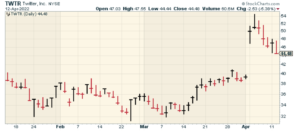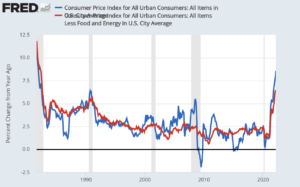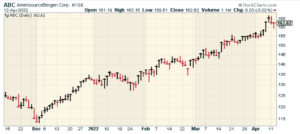CWS Market Review – April 12, 2022
(This is the free version of CWS Market Review. If you like what you see, then please sign up for the premium newsletter for $20 per month or $200 for the whole year. If you sign up today, you can see our two reports, “Your Handy Guide to Stock Orders” and “How Not to Get Screwed on Your Mortgage.”)
Change That: Elon Musk Won’t Be on Twitter’s Board
In last week’s issue, I discussed Elon Musk taking a large stake in Twitter and being invited to join its board. The stock soared 30% in one day which helped the richest man in the world become even wealthier. Musk agreed not to own more than 14.9% of the company.
That story got an update this week. Twitter said that Mr. Musk will not join its board.
What happened? We don’t know the precise details, but I’m assuming the lawyers had a long talk with Musk and explained that even he can’t do some things as a board member. A board member has a fiduciary obligation to act in the best interest of the shareholders.

That could be a wee bit of a problem for someone like Elon. For example, Musk suggested turning Twitter’s San Francisco headquarters into a homeless shelter. Make of that what you will. Musk also suggested deleting the “w” from Twitter’s name. You can see how this kind of behavior might be…problematic.
As a board member, Musk would be banned from trolling the company or from commenting on non-public information. This is hardly the first time that Musk’s tweets have gotten him in hot water.
In 2018, Musk famously tweeted that Tesla had “secured” a buyout offer. For that, the SEC fined him $20 million. That would be like levying a fine of $10 on a person with a net worth of $140,000.
Personally, I’m a big fan of Elon. I like the idea that there’s a multi-zillionaire who goes out and says whatever he likes. I also realize that a good part of Musk—say, 30%— is pure showman. He’s often closer to P.T. Barnum than he is Ford or Edison. Of course, those folks were part-showmen, too.
There’s also an important angle to this in that the founders of Twitter never bothered to structure the company to prevent it from being taken over by activist investors. Alphabet, the parent company of Google, has different voting classes of stock which are designed to prevent someone on the outside from taking over the company. Facebook has also prevented itself from being easily pushed around.
All in all, I don’t like these dual-class structures. The argument used to be made that it could be important for some companies, such as newspapers, that needed to be protected from outside shareholders. Years ago, some companies viewed themselves as guardians of the public trust. Naïve? Probably, but they believed it. I suppose there’s an argument to be made for dual classes, but I’d much rather see regular shareholders treated best.
There’s perhaps some irony in that Elon Musk can probably best serve shareholders off the board and make his feelings known without restrictions. How else? Via Twitter.
Inflation Jumps to Highest Since 1981
We had another inflation report this morning and it was a doozy. I’ve become used to saying that inflation has soared to its highest level since 1982. That’s now changed. Thanks to the March inflation report, we can now say that inflation is at its highest level since December 1981.
The report said that last month, headline inflation rose by 1.24%. That brought the 12-month rate to 8.56%. At the current rate of inflation, for a $1 million portfolio, inflation eats up $85,575 per year. For the Dow Jones Industrial Average, inflation gobbles up 3,000 points every year.
Most disturbingly, at the current rate of inflation, if you’re paid in dollars, you effectively work one month of the year for free. That’s all due to inflation.
Here’s a chart of headline inflation in blue and core inflation in red:

The stock market responded by rallying more than 1.3% this morning. It later thought things over and decided that wasn’t a good idea. The market retreated for a daily loss of 0.34%. In the last 10 sessions, the S&P 500 has lost a little over 5%. The yield on the 10-year Treasury got all the way up to 2.77% today. Of course that’s still low, but it‘s a lot higher than where it was two years ago. The average 30-year mortgage rate is now up to 5.25%.
You can see that inflation truly causes chaos for an economy. Here’s a quote to ponder from John Maynard Keynes:
By a continuing process of inflation, governments can confiscate, secretly and unobserved, an important part of the wealth of their citizens. By this method they not only confiscate, but they confiscate arbitrarily; and, while the process impoverishes many, it actually enriches some. The sight of this arbitrary rearrangement of riches strikes not only at security but at confidence in the equity of the existing distribution of wealth.
This morning’s inflation report was also noteworthy because it’s the first report to be impacted by the war in Ukraine. Energy prices were up 11% last month. Not annualized, but for the whole month.
If there’s any consolation, it’s that core inflation appears to be far more modest. Last month, consumer prices excluding food and energy rose by just 0.32%. That’s really not so bad. Over the past year, core inflation is running at 6.44%. That’s the highest since August 1982, which happens to be the same month the stock market reached a generational low.
This low core inflation number for March could be good news going forward. I say that very cautiously. The increase for March was the slowest of the last six months, and the fourth-slowest of the last 12 months. If we assume that the headline rate will eventually move towards the core rate, then our inflation problems could be over soon. That’s a lot to assume for now, but it’s worth taking note of.
What’s also interesting is that the 2/10 Spread has backed off significantly over the past few days. On April 1, the two-year Treasury was yielding 0.05% more than the 10-year Treasury. That’s usually a signal of more Fed tightening and slower economic growth. Since then, the 2/10 Spread has turned positive. The 10-year now yields 0.33% more than the two-year. Perhaps the Fed doesn’t have a lot more work to do? Again, it’s too early to draw sweeping conclusions, but it’s not to be ignored.
My Mistake with AmerisourceBergen
We all learn from our mistakes including me. To quote Freddie, “bad mistakes, I’ve made a few.” I find it useful to go over my past errors and try to learn from what I did wrong.
I made a big one this year. In January, I told you how I strongly considered adding AmerisourceBergen (ABC) to our Buy List, but ultimately, I decided to pass. The stock is up over 20% this year. Smooth move, Eddy!

Here’s some of what I wrote:
There’s a lot to like about AmerisourceBergen. If you’re not familiar with the company, ABC is a major drug wholesaler. The company was formed 20 years ago through the merger of Bergen Brunswig and AmeriSource. They also have units offering consulting services and veterinary supply.
It’s a great business to be in. I especially like their smooth earnings line. This is an important characteristic in a successful company. Some businesses see their earnings bounce all around during a business cycle. Other stocks, by contrast, churn out steady increases. All things being equal, the market prefers the steady increases.
The stock is literally ABC. How could I have passed?
Frankly, it’s not the worst of errors to pass on a good stock. As investors, we should be very discerning. My mistake was not realizing how strongly the market would favor stocks with consistent earnings growth. I also didn’t fully realize how the company had addressed its legal issues.
But first, here’s the yearly earnings for AmerisourceBergen:
2017: $5.62
2018: $5.88
2019: $6.49
2020: $7.09
2021: $7.90
2021: $9.26
2022: $10.80 (est.)
2023: $11.60 (est.)
2024: $12.45 (est.)
Those numbers are exactly what we’re looking for. Steady upwards growth. But numbers don’t tell you everything.
While AmerisourceBergen appeared to be inexpensive based on conventional valuations, I was put off by its legal risks for its role in the opioid epidemic. Over a 20-year period, nearly half a million Americans died from opioid addiction.
Last July, AmerisourceBergen and two other drug companies, Cardinal Health and McKesson, reached a major settlement with several state governments. The deal calls for the drug companies to pay $21 billion over the next 18 years. ABC’s portion comes to $6.4 billion. The deal is intended to address, in one big action, more than 3,000 lawsuits. None of the companies has admitted to any wrongdoing.
I’m still not certain if that ends the matter for ABC. So far this year, the stock market appears to be greatly relieved. That’s a decision I felt I couldn’t adequately make in January. Investing is about predicting the future. Instead, it’s about weighing the risks and potential benefits.
The other lesson with investing is to not beat yourself up for “the one the got away.” Chasing it is not the answer. Instead, be patient and wait for the next chance. There’s no game clock with investing. We can pass on as many stocks as we like.
That’s all for now. I’ll have more for you in the next issue of CWS Market Review.
– Eddy
P.S. Q1 earnings season starts soon, and this looks to be another good season for us. Don’t forget to sign up for our premium newsletter.
Posted by Eddy Elfenbein on April 12th, 2022 at 7:56 pm
The information in this blog post represents my own opinions and does not contain a recommendation for any particular security or investment. I or my affiliates may hold positions or other interests in securities mentioned in the Blog, please see my Disclaimer page for my full disclaimer.
-
-
Archives
- April 2025
- March 2025
- February 2025
- January 2025
- December 2024
- November 2024
- October 2024
- September 2024
- August 2024
- July 2024
- June 2024
- May 2024
- April 2024
- March 2024
- February 2024
- January 2024
- December 2023
- November 2023
- October 2023
- September 2023
- August 2023
- July 2023
- June 2023
- May 2023
- April 2023
- March 2023
- February 2023
- January 2023
- December 2022
- November 2022
- October 2022
- September 2022
- August 2022
- July 2022
- June 2022
- May 2022
- April 2022
- March 2022
- February 2022
- January 2022
- December 2021
- November 2021
- October 2021
- September 2021
- August 2021
- July 2021
- June 2021
- May 2021
- April 2021
- March 2021
- February 2021
- January 2021
- December 2020
- November 2020
- October 2020
- September 2020
- August 2020
- July 2020
- June 2020
- May 2020
- April 2020
- March 2020
- February 2020
- January 2020
- December 2019
- November 2019
- October 2019
- September 2019
- August 2019
- July 2019
- June 2019
- May 2019
- April 2019
- March 2019
- February 2019
- January 2019
- December 2018
- November 2018
- October 2018
- September 2018
- August 2018
- July 2018
- June 2018
- May 2018
- April 2018
- March 2018
- February 2018
- January 2018
- December 2017
- November 2017
- October 2017
- September 2017
- August 2017
- July 2017
- June 2017
- May 2017
- April 2017
- March 2017
- February 2017
- January 2017
- December 2016
- November 2016
- October 2016
- September 2016
- August 2016
- July 2016
- June 2016
- May 2016
- April 2016
- March 2016
- February 2016
- January 2016
- December 2015
- November 2015
- October 2015
- September 2015
- August 2015
- July 2015
- June 2015
- May 2015
- April 2015
- March 2015
- February 2015
- January 2015
- December 2014
- November 2014
- October 2014
- September 2014
- August 2014
- July 2014
- June 2014
- May 2014
- April 2014
- March 2014
- February 2014
- January 2014
- December 2013
- November 2013
- October 2013
- September 2013
- August 2013
- July 2013
- June 2013
- May 2013
- April 2013
- March 2013
- February 2013
- January 2013
- December 2012
- November 2012
- October 2012
- September 2012
- August 2012
- July 2012
- June 2012
- May 2012
- April 2012
- March 2012
- February 2012
- January 2012
- December 2011
- November 2011
- October 2011
- September 2011
- August 2011
- July 2011
- June 2011
- May 2011
- April 2011
- March 2011
- February 2011
- January 2011
- December 2010
- November 2010
- October 2010
- September 2010
- August 2010
- July 2010
- June 2010
- May 2010
- April 2010
- March 2010
- February 2010
- January 2010
- December 2009
- November 2009
- October 2009
- September 2009
- August 2009
- July 2009
- June 2009
- May 2009
- April 2009
- March 2009
- February 2009
- January 2009
- December 2008
- November 2008
- October 2008
- September 2008
- August 2008
- July 2008
- June 2008
- May 2008
- April 2008
- March 2008
- February 2008
- January 2008
- December 2007
- November 2007
- October 2007
- September 2007
- August 2007
- July 2007
- June 2007
- May 2007
- April 2007
- March 2007
- February 2007
- January 2007
- December 2006
- November 2006
- October 2006
- September 2006
- August 2006
- July 2006
- June 2006
- May 2006
- April 2006
- March 2006
- February 2006
- January 2006
- December 2005
- November 2005
- October 2005
- September 2005
- August 2005
- July 2005
 Eddy Elfenbein is a Washington, DC-based speaker, portfolio manager and editor of the blog Crossing Wall Street. His
Eddy Elfenbein is a Washington, DC-based speaker, portfolio manager and editor of the blog Crossing Wall Street. His